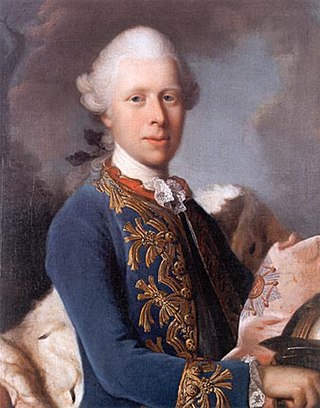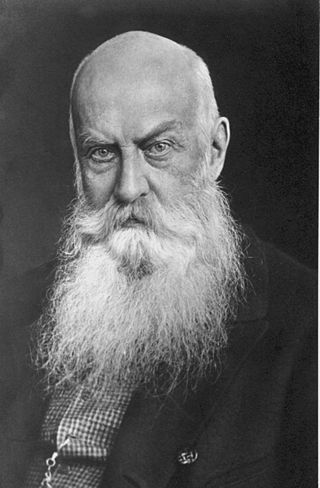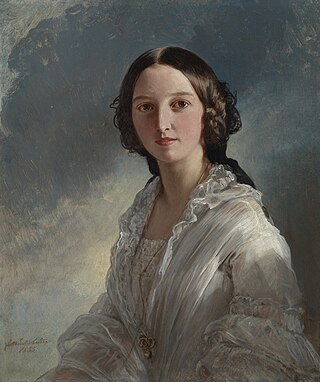Related Research Articles

A theatre director or stage director is a professional in the theatre field who oversees and orchestrates the mounting of a theatre production such as a play, opera, dance, drama, musical theatre performance, etc. by unifying various endeavors and aspects of production. The director's function is to ensure the quality and completeness of theatre production and to lead the members of the creative team into realizing their artistic vision for it. The director thereby collaborates with a team of creative individuals and other staff to coordinate research and work on all the aspects of the production which includes the Technical and the Performance aspects. The technical aspects include: stagecraft, costume design, theatrical properties (props), lighting design, set design, and sound design for the production. The performance aspects include: acting, dance, orchestra, chants, and stage combat.

Adelaide of Saxe-Meiningen was Queen of the United Kingdom of Great Britain and Ireland and Queen of Hanover from 26 June 1830 to 20 June 1837 as the wife of King William IV. Adelaide was the daughter of George I, Duke of Saxe-Meiningen, and Luise Eleonore of Hohenlohe-Langenburg. Adelaide, the capital city of South Australia, is named after her.

Epic theatre is a theatrical movement that arose in the early to mid-20th century from the theories and practice of a number of theatre practitioners who responded to the political climate of the time through the creation of new political dramas. Epic theatre is not meant to refer to the scale or the scope of the work, but rather to the form that it takes. Epic theatre emphasizes the audience's perspective and reaction to the piece through a variety of techniques that deliberately cause them to individually engage in a different way. The purpose of epic theatre is not to encourage an audience to suspend their disbelief, but rather to force them to see their world as it is.

Saxe-Meiningen was one of the Saxon duchies held by the Ernestine line of the House of Wettin, located in the southwest of the present-day German state of Thuringia.

Meiningen is a town in the southern part of the state of Thuringia, Germany. It is located in the region of Franconia and has a population of around 26,000 (2024). Meiningen is the capital and the largest town of the Schmalkalden-Meiningen district. From 1680 to 1920, Meiningen was the capital of the Duchy of Saxe-Meiningen.

Nineteenth-century theatre describes a wide range of movements in the theatrical culture of Europe and the United States in the 19th century. In the West, they include Romanticism, melodrama, the well-made plays of Scribe and Sardou, the farces of Feydeau, the problem plays of Naturalism and Realism, Wagner's operatic Gesamtkunstwerk, Gilbert and Sullivan's plays and operas, Wilde's drawing-room comedies, Symbolism, and proto-Expressionism in the late works of August Strindberg and Henrik Ibsen.

The Deutsches Theater is a theater in Berlin, Germany. It was built in 1850 as Friedrich-Wilhelm-Städtisches Theater, after Frederick William IV of Prussia. Located on Schumann Street (Schumannstraße), the Deutsches Theater consists of two adjoining stages that share a common, classical facade. The main stage was built in 1850, originally for operettas.

Ernest II, Duke of Saxe-Gotha-Altenburg was the reigning Duke of Saxe-Gotha-Altenburg from 1772 to 1804. He was the third but second surviving son of Frederick III, Duke of Saxe-Gotha-Altenburg and Luise Dorothea of Saxe-Meiningen. The death of his older brother Frederick in 1756 made him the heir to the duchy of Saxe-Gotha-Altenburg.

George II, Duke of Saxe-Meiningen, was the penultimate Duke of Saxe-Meiningen, reigning from 1866 to 1914. For his support for his successful court theatre he was also known as the Theaterherzog.

Ellen Franz, also known as Helene, Baroness von Heldburg was a German pianist and actress.

Princess Charlotte of Prussia was, by birth, the Princess of Prussia and a member of the House of Hohenzollern. By marriage, she became Hereditary Princess of Saxe-Meiningen.

Princess Feodora Victoria Adelheid of Hohenlohe-Langenburg was the daughter of Ernst I, Prince of Hohenlohe-Langenburg and Princess Feodora of Leiningen. She married Georg II, Duke of Saxe-Meiningen, and was the Duchess of Saxe-Meiningen from his accession as Duke Georg II on 20 September 1866 until her death in 1872.

Elisabethenburg Palace is a Baroque palace located on the northwestern edge of Meiningen in Germany. Until 1918 it was the residence of the Dukes of Saxe-Meiningen. The castle now houses the Meininger Museum as well as the Max Reger archives, the Thuringian State Archives, the Max Reger music school, the Johannes Brahms concert hall, a restaurant, the tower Cafe, and the ceremonial rooms of the Meinigen City Council and Registry Office.

Princess Augusta of Saxe-Meiningen was the daughter of Bernhard II, Duke of Saxe-Meiningen and his wife Princess Marie Frederica of Hesse-Kassel. She was the mother of Ernst II, Duke of Saxe-Altenburg.

Princess Marie Elisabeth of Saxe-Meiningen was the only daughter of George II, Duke of Saxe-Meiningen, by his first wife, Princess Charlotte of Prussia. She was notable as a musician and composer. One of her most famous works is Romanze in F major for clarinet and piano.

Ludwig Chronegk was a German actor and director. He headed the Meiningen Ensemble and reformed theatre direction principles.

The Meiningen Court Orchestra is one of the oldest and most traditional orchestras in Europe. Since 1952 the now 68-member orchestra has been affiliated to the Meiningen Court Theatre and in addition to their opera performances regularly give symphony concerts and youth concerts. The incumbent music director (GMD) is Philippe Bach.
Events in the year 1890 in Germany.

The Staatstheater Meiningen, also called the Meiningen Theatre, is a four-division theater in the Thuringian town of Meiningen, Germany. The theater was founded in 1831 and was called ″Meininger Hoftheater″ until 1920.
The Max Reger Art Prize was an art prize of the Bezirk Suhl in the German Democratic Republic. It was awarded annually on 7 October on the occasion of Tag der Republik to personalities from the fields of science and art in the district of Suhl. The prize was named after the composer and conductor Max Reger, who lived in the former residential town of Meiningen from 1911 to 1915 and conducted the Meiningen Court Orchestra there until 1914. This humanistic tradition of the town of Meiningen expired with the German Reunification Treaty in 1990.
References
- ↑ Innes, Christopher, ed. (2000). A Sourcebook on Naturalist Theatre . London and New York: Routledge. p. 10. ISBN 0-415-15229-1.
- ↑ "Gesamtkunstwerk". The Art Story. THE ART STORY FOUNDATION. Retrieved March 7, 2024.
- ↑ Koller, Ann Marie (1984). The Theater Duke: George II of Saxe-Meiningen and the German Stage. Palo Alto, CA: Stanford University Press. ISBN 0-8047-1196-8.
- ↑ Johnson, Daniel (2017). Theatre and Phenomenology: Manual Philosophy. London, UK: Palgrave. ISBN 9781137530523.